Foundry & industrial processing Machinery EQUIPMENT & SYSTEMS
U.S. & Canada Call 1.800.457.5456
Understanding Mixer Pumping Systems
Home Articles Understanding Mixer Pumping Systems

Simple Solutions That Work!™, Volume 10, April 2019
By Palmer staff
Palmer Manufacturing & Supply, Inc.
Article Takeaways:
- Differences between direct and magnetically coupled gear pumps
- Benefits of two and three-way valves
- Advanced systems for safety
Foundry mixer pumping systems can be basic, or complex depending on the exact needs of the foundry. We will review some of the different styles available and point out some of the advantages of each.
PUMP TYPES
Direct shaft coupled gear pumps – These have been used in the foundry industry for nearly the last century and are the most common type of pump that will be found on most mixers already in use. For most foundry applications, these pumps will have a cast-iron body, a steel shaft, a gear, and a rope-style packing. The advantages to this style of pump are that it is very simple and serviceable by most maintenance technicians, and since they have a direct drive, the torque of the pump is as strong as the motor driving it. They are also the lowest cost style of pump that is used regularly. The disadvantages to this style of pump are that due to the rope style packings and the rotating shaft, the pump will seep resin and leak over time. The pumps can be rebuilt which will reduce the leaks, but they will still occur at a slower pace.
Magnetically coupled gear pumps – these are a more recent style of pump and have been used for the past several decades. Most new mixers being built now will have this steel-bodied style as the standard offering. As you can imagine, the major benefit of this style of pump is that it does not leak like the shaft coupled units do. Due to the completely sealed housing and the magnetic coupling, there are no seals that are separating moving parts from open air, so there are very few places for leaks to occur. These pumps are usually more accurate and repeatable than a shaft coupled unit also. The disadvantage to this style pump is that it is more costly to purchase than the shaft coupled unit, but this can easily be overcome by reduced maintenance for rebuilds and also avoiding environmental issues brought on by shaft coupled pumps that leak. Since this unit lacks a direct drive like the shaft coupled unit, the torque that can be induced to the pump is only as strong as the magnet used for the coupling. Resin density, temperature range, and throughput requirement will determine the ideal magnet strength to be used. Stronger magnets are certainly available, but the cost of the coupling often exceeds the cost of the pump, so it is important to size the magnet appropriately for the application
Both direct and magnetically coupled style pumps are available in many different alloys as well to work with any specific resins that may be caustic. The most common for foundry use is Hastalloy, which is commonly used for Furan Resin Systems.

VALVE TYPES
On/off two-way valves – these are a simple air-actuated valve with an inlet and a discharge. These are commonly used with mixers to prevent backflow due to gravity when the gear pumps are not running.
Recirculating three-way valves – these are an air-actuated valve that has one inlet and two discharges. These are commonly used with mixers where the pump is left running at all times that the mixer is powered, and the valve simply diverts flow to the mixing chamber during mix cycles. When a mix cycle is finished, the resin will divert back through a recirculation line to the supply tank. Most new mixers being built now will have this steel-bodied style as the standard offering.
PLUMBING RECOMMENDATIONS
For an on/off type system, the sequence of components is usually:
- Supply tank
- On/off two-way valve
- Pump
- Mixer chemical nozzle
For a recirculating type system, the sequence of components is usually:
- Supply tank
- Pump
- Recirculating three-way valve
- Mixer chemical nozzle – OR – Return line to supply tank
Most foundry pumps are designed to push resins rather than pull them. For this reason, the best practices include:
- Resin hoses feeding the pumps should be a larger diameter than the lines feeding from the pumps
- Resin hoses should run downhill from the supply tank to the pump, with the pump being the lowest part of the system
- Resin hoses should run uphill from the pumps to the recirculating valves, and continue uphill to the mixer chemical nozzle. The chemical nozzle should be the highest part of the system after the pump
- Air bubbles are your enemy. Make as few joints in the lines as possible to avoid air bubbles, and always make the system easy to evacuate air bubbles from when found. Long runs of hard horizontal pipe should be avoided.
If using long runs of hard pipe, try to arrange for it to run slightly uphill to avoid air bubble gathering.
OPTIONAL UPGRADES
Most basic mixers are regularly calibrated to ensure that the pump output matches a desired value. In this case, there is the possibility that a flow restriction can occur and the output of the pump would suffer as the controls are merely feeding the pump a signal to run at a specific voltage or frequency. In the case that the resin flow needs to be guaranteed for your application, this is where a Mass Flow Resin Monitoring System would come into play. This is an upgrade where a Coriolis massflow meter is placed between the pump and the recirculating valve and it measures the flow rate of the resin being delivered. If there are variances away from the flow rate desired, the system will automatically speed or slow the pump to compensate. In the case that the system cannot compensate for the flow deviation, an alarm will sound. The mass flow system can also be used to adjust resin input amount based on the measured sand temperature, allowing the mixer to automatically adjust resin flow to maintain a consistent set time for the sand.
As government agencies and safety are becoming more involved in operations and installations, we are also finding that Bulk Resin Distribution Systems are becoming much more popular. These are systems that allow several mixers to be fed from a single bulk resin supply tank set. Depending on the physical layout of the mixers, small daytank sets with inlet valves and level sensors will be located near the mixer. The mixer will feed from and recirculate to these daytanks. The daytank however, will be fed by a separate pump which is located near the large bulk tanks and is refilled automatically when the daytank level reaches a low sensor. This allows the bulk resin storage to be located in a more fire-safe area and with spill containment measures in place, without having to crowd the mixer area.
CLOSING AND OTHERS
Palmer has what is considered our standard offering, which includes magnetically coupled gear pumps and recirculating three-way valves, but can certainly handle any type of pump system style which best fits your specific application requirements. There are many other types available based on weight flow rate, volumetric flow rate, shear sensitive materials, pneumatically pressurized systems, mechanical bellows systems, and more.
Copyright © 2025 Palmer Manufacturing & Supply, Inc. | Terms and Conditions | Privacy Policy




